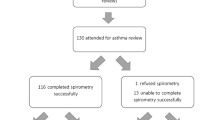Abstract
Background:
Exhaled nitric oxide (FENO) measurements may help to highlight when inhaled corticosteroid (ICS) therapy should or should not be adjusted in asthma. This is often difficult to judge. Our aim was to evaluate a decision-support algorithm incorporating FENO measurements in a nurse-led asthma clinic.
Methods:
Asthma management was guided by an algorithm based on high (>45ppb), intermediate (30-45ppb), or low (<30ppb) FENO levels and asthma control status. This provided for one of eight possible treatment options, including diagnosis review and ICS dose adjustment.
Results:
Well controlled asthma increased from 41% at visit 1 to 68% at visit 5 (p=0.001). The mean fluticasone dose decreased from 312 mcg/day at visit 2 to 211mcg/day at visit 5 (p=0.022). There was a high level of protocol deviations (25%), often related to concerns about reducing the ICS dose. The % fall in FENO associated with a change in asthma status from poor control to good control was 35%.
Conclusion:
An FENO-based algorithm provided for a reduction in ICS doses without compromising asthma control. However, the results may have been influenced by the education and support which patients received. Reluctance to reduce ICS dose was an issue which may have influenced the overall results.
Trial registration:
Australian Clinical Trials Registry # 012605000354684
Similar content being viewed by others
Article PDF
Author information
Authors and Affiliations
Corresponding author
Ethics declarations
Competing interests
The researchers received a grant of $25,000 from Aerocrine AB, Solna, Sweden, a manufacturer of nitric oxide analysers to conduct this study. DRT has received lecture fees of $2000 from Aerocrine AB, Solna, Sweden.
Rights and permissions
About this article
Cite this article
Hewitt, R., Modrich, C., Cowan, J. et al. Outcomes using exhaled nitric oxide measurements as an adjunct to primary care asthma management. Prim Care Respir J 18, 320–327 (2009). https://doi.org/10.4104/pcrj.2009.00060
Received:
Revised:
Accepted:
Published:
Issue date:
DOI: https://doi.org/10.4104/pcrj.2009.00060
This article is cited by
-
Qualitative study on perceptions of use of Fractional Exhaled Nitric Oxide (FeNO) in asthma reviews
npj Primary Care Respiratory Medicine (2022)
-
Significance of fractional exhaled nitric oxide combined with serum procalcitonin and C-reactive protein in evaluation of elderly asthma
Journal of Huazhong University of Science and Technology [Medical Sciences] (2013)


